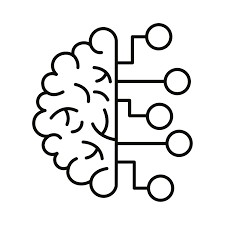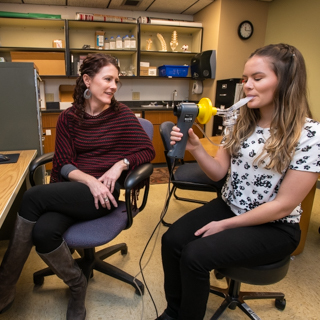MIND Lab

Welcome to the MIND Lab!
Develop your MIND in the Meaningful Intervention for NeuroDiversity Lab
Mission
The mission of the MIND (Meaningful Intervention for NeuroDiversity) Lab at the University of Montana is to investigate the effectiveness of evidenced-based practices for people that experience autism and neurodiversity across the lifespan and explore pedagogy related to adult learning.
People and Projects
Jennifer Schoffer Closson, Ed D, CCC-SLP is a licensed speech-language pathologist, the director of the MIND Lab, and the developer and founder of the YETI (Youth Engagement Through Intervention) and MOSSAIC (Mentoring, Organization, and Social Support for Autism/All Inclusion on Campus). Dr. Schoffer Closson is an associate clinical professor in the School of Speech, Language, Hearing, and Occupational Sciences. She specializes in autism and neurodiversity throughout the lifespan, pedagogy, and neurodiversity inclusion.
Haley Permar, MS CCC-SLP, is an ASHA certified Speech Language Pathologist who works as a Research Associate for the Rural Institute for Inclusive Communities. Haley worked as a school based SLP prior to transitioning to a research role. She has completed extensive interdisciplinary training through the AHEC scholars’ program and Utah Regional Leadership Education in Neurodevelopmental Disability (UR-LEND) program, including an Autism Enhanced Year focusing on best practices for interdisciplinary assessment and treatment of autism. Haley is excited to contribute to the MIND lab’s research goals.
Leah Meloy, MS CCC-SLP, is the DeWit RiteCare Clinic director and a licensed speech-language pathologist. Professor Meloy has been enthusiastic in her implementation of clinical simulations through interprofessional practice events and classroom-based learning (FASST Fridays). She is contributing to the research on Computer Aided Clinical Simulation Research.
Katelin Cox is an undergraduate student in the UM Communication Sciences and Disorders department. She is excited to contribute to the Computer Aided Clinical Simulation research. Ms. Cox will be a research assistant for the 23-24 school year.
Social Optics Research
Carolyn Long, MCD SLP-CCC, is the developer of Social Optics, an online platform to teach social understanding. This evidence-based learning opportunity directly addresses rural disparity and professional shortages. We are collaborating to understand the effectiveness of computer aided instruction using the Social Optics program.
Computer Aided Clinical Simulation Research
Dr. Schoffer Closson developed a simulation lab to train student clinicians and broaden their clinical experiences. Professor Permar has been an integral part in developing the lab and its offerings. Professor Meloy implements different models of clinical simulation in her coursework. Research is focused on the experiences of the learners and to determine the efficacy of this modality of learning for clinical preparedness.
Service-Learning in Communication Sciences and Disorders Undergraduates
This research examines the impacts of service-learning on undergraduate students. The current focus is on the CSD 396 Service-Learning Class and engagement with participants in the MOSSAIC program.
Pre-Service Interprofessional Collaboration Through Youth Engagement Through Intervention (YETI)
Completed as part of Haley (Nelson) Permar’s master’s thesis project [2017-2019], this research focuses on how the interprofessional collaborative experience of Youth Engagement Through Intervention (YETI) changed perceptions and knowledge regarding scope of practice of pre-service professionals in the Communicative Sciences and Disorders (CSD), School Psychology, and Clinical Psychology programs. The research is currently being adapted for publication. The full thesis document can be downloaded from Scholar Works.
Impact
The goals of the MIND Lab are to:
- Contribute to the body of knowledge regarding evidence-based practices for people with autism and neurodiverse learners.
- Develop our understanding about the impact of non-traditional learning models for undergraduate students in Communication Sciences and Disorders programs.
